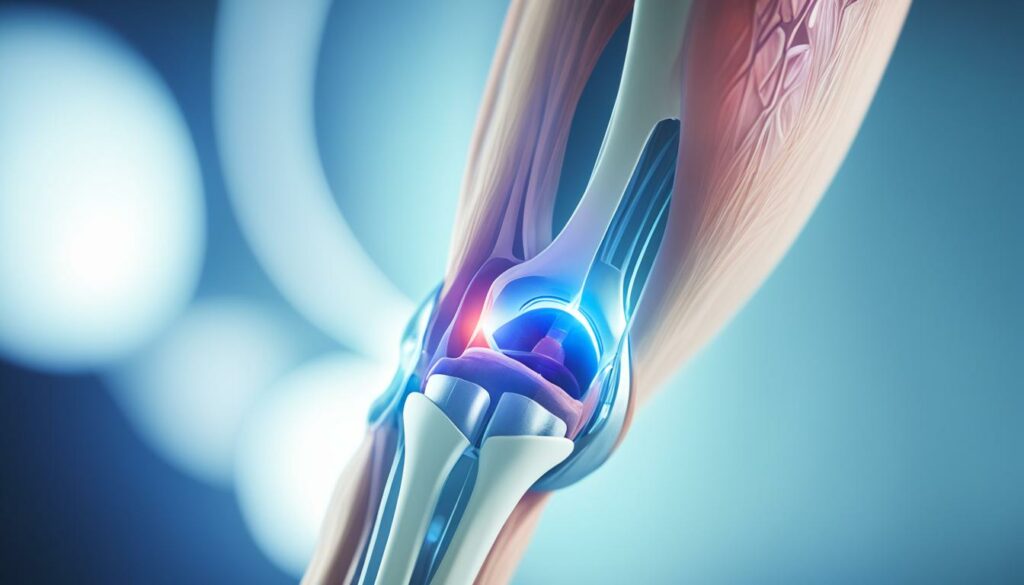If you suffer from knee arthritis and are looking for an effective non-surgical solution, stem cell therapy may be the answer you’ve been searching for. Stem cell transplantation, using either stem cells from umbilical tissue or a person’s own adipose fat, has shown promising results in relieving knee pain caused by osteoarthritis.
A meta-analysis of 16 studies involving 875 patients found that stem cell therapy significantly decreases knee pain starting at three months of treatment. As the most commonly affected joint by osteoarthritis, knee pain affects millions of people worldwide. Stem cell therapy offers a potential solution to decrease pain and improve functionality in arthritic knees.
- Stem cell therapy is an effective non-surgical treatment for knee arthritis.
- It uses stem cells from umbilical tissue or a person’s own adipose fat.
- In clinical studies, stem cell therapy reduced knee pain starting at three months of treatment.
- Knee arthritis affects millions of people worldwide.
- Stem cell therapy offers a potential solution for decreasing pain and improving knee functionality.
The Benefits of Stem Cell Injections for Knee Arthritis
Stem cell injections for knee arthritis offer several benefits. These innovative treatments utilize regenerative medicine to provide relief from knee pain and improve joint function. By harnessing the powerful regenerative properties of stem cells, this therapy has shown promising results in the field of knee osteoarthritis treatment.
One of the key benefits of stem cell injections is their ability to regenerate knee joints. Stem cells derived from umbilical cord tissue or a patient’s own adipose fat cells have the remarkable capability to differentiate into various cell types, including those found in joints, muscles, bones, ligaments, and cartilage. By introducing these stem cells into the affected knee joint, they can stimulate the production of new cartilage cells, helping to repair and regenerate damaged tissue.
Furthermore, stem cell injections have been found to suppress inflammation in the knee joint. Inflammation is a common factor contributing to knee pain in individuals with arthritis. The anti-inflammatory properties of stem cells can help alleviate pain and reduce further damage to the joint.
In addition to their regenerative and anti-inflammatory effects, stem cell injections release proteins that slow down cartilage degeneration. These proteins act as protective agents, preserving the cartilage in the knee joint and preventing its deterioration over time. By slowing down the degeneration process, stem cell therapy can effectively decrease pain and improve overall joint function.
Stem cell therapy for knee arthritis is considered safe and minimally invasive. When utilizing a patient’s own cells, there is minimal risk of rejection or adverse reactions. The procedure typically involves a simple injection into the knee joint, with minimal side effects such as temporary pain and swelling at the injection site. Compared to traditional surgical interventions, stem cell therapy offers a less invasive alternative with reduced risks and faster recovery times.
The benefits of stem cell injections for knee arthritis are summarized in the table below:
| Benefits of Stem Cell Injections for Knee Arthritis |
|---|
| Regeneration of knee joints |
| Development of new cartilage cells |
| Suppression of inflammation |
| Release of proteins that slow down cartilage degeneration |
| Safe and minimally invasive |
The Role of Stem Cell Therapy in Knee Pain Management
Stem cell therapy plays a crucial role in the management of knee pain. It offers an innovative and advanced treatment option for individuals suffering from arthritic knees. By utilizing the regenerative potential of stem cells, this therapy aims to repair and regenerate damaged knee joints. Stem cells can help in the formation of new cartilage, decrease inflammation, and slow down further degeneration.
Studies and meta-analyses have provided substantial evidence supporting the effectiveness of stem cell therapy in relieving knee pain and improving joint function. Research has shown that this treatment modality can significantly reduce pain and improve mobility in patients with arthritic knees.
“Stem cell therapy has emerged as a promising and cutting-edge approach for knee pain management. By harnessing the regenerative power of stem cells, we can target the underlying causes of knee arthritis and promote tissue repair.” – Dr. Jane Anderson, Orthopedic Surgeon
One of the key advantages of stem cell therapy is its ability to provide a natural and non-surgical solution for knee pain. Unlike traditional treatments that focus on symptom management, stem cell therapy aims to address the root cause of the problem by stimulating the body’s own healing mechanisms.
Innovative Treatment for Arthritic Knees
Stem cell therapy represents an innovative treatment approach for arthritic knees. It offers a revolutionary way to treat knee osteoarthritis by facilitating the regeneration of damaged joint tissues. Rather than relying on invasive surgical procedures or palliative measures, stem cell therapy takes advantage of the body’s inherent capacity for self-repair.
The potential of stem cell therapy lies in its ability to differentiate into various cell types, including those found in joints, muscles, bones, ligaments, and cartilage. This versatility allows stem cells to promote tissue regeneration and enhance the healing process in the knee joint.
Moreover, stem cell therapy offers a personalized and patient-specific treatment strategy. Stem cells can be sourced from a patient’s own adipose fat tissue or derived from umbilical cord tissue. This ensures compatibility and minimizes the risk of rejection or adverse reactions.
Advanced Stem Cell Therapy for Knee Joints
The field of stem cell therapy continues to advance, with ongoing research focusing on optimizing treatment protocols and improving outcomes. Scientists are exploring different types of stem cells, their sources, and their dosing to provide the most effective and safe treatment for knee osteoarthritis.
Currently, stem cell therapy for knee joints is performed through minimally invasive injections. The stem cells are carefully delivered to the site of joint damage, where they can promote tissue regeneration and reduce inflammation. This targeted approach enhances the therapeutic effects of stem cell therapy while minimizing potential side effects.
As advancements in stem cell research and technology progress, the future of stem cell therapy for knee arthritis looks promising. Continued innovation and refinement of treatment techniques will contribute to improved knee pain management and enhanced overall joint health.
| Benefits of Stem Cell Therapy for Knee Pain | Traditional Treatments for Knee Pain |
|---|---|
|
|
The Process of Stem Cell Therapy for Knee Osteoarthritis
Stem cell therapy offers a natural and minimally invasive treatment option for individuals with knee osteoarthritis. The process involves the extraction of stem cells either from the patient’s own body or from umbilical cord tissue. These stem cells, rich in regenerative potential, are then injected into the knee joint to initiate the healing process.
When introduced into an arthritic knee joint, stem cells have the remarkable ability to develop into new cartilage cells, which can help repair the damaged tissue. Additionally, stem cells suppress inflammation in the knee joint and release proteins that decelerate the degeneration of cartilage, thus reducing pain and improving joint functionality.
By utilizing the patient’s own cells, stem cell therapy minimizes the risk of adverse reactions or rejections. The procedure is performed in a controlled and sterile environment, ensuring safety and effectiveness. Moreover, stem cell therapy promotes the body’s natural healing mechanisms, allowing for a more natural and holistic approach to treating knee osteoarthritis.
Stem cell therapy for knee osteoarthritis offers several advantages over traditional treatments, including:
- Non-surgical: Unlike surgical options like knee replacement, Stem cell therapy provides a non-surgical alternative to alleviate knee pain.
- Regenerative: Stem cells have the ability to regenerate damaged tissue, promoting the growth of new cartilage cells and improving joint health.
- Minimally invasive: With stem cell injections, there is no need for extensive incisions or lengthy recovery periods, minimizing disruption to daily life.
- Potential long-term benefits: Stem cell therapy aims to address the underlying cause of knee osteoarthritis, potentially providing long-lasting pain relief and improved joint functionality.
Overall, stem cell therapy offers a promising and natural treatment option for knee osteoarthritis, providing patients with the potential for reduced pain, improved mobility, and an enhanced quality of life.
| Advantages of Stem Cell Therapy for Knee Osteoarthritis |
|---|
| Non-surgical alternative |
| Regenerative potential |
| Minimally invasive procedure |
| Potential long-term benefits |
Comparing Stem Cell Therapy to Traditional Treatments for Knee Pain
When it comes to finding relief for your knee pain, you have several treatment options available. Traditional treatments often involve surgical procedures like knee replacement, which can be invasive and require a long recovery time. However, there is a non-surgical solution that provides cutting-edge regenerative therapy for knee pain: Stem cell therapy.
Unlike surgical options, stem cell therapy harnesses the body’s natural healing ability to repair and regenerate damaged knee joints. It offers a non-invasive and innovative approach to treating knee pain, focusing on restoring the integrity of the joint rather than simply replacing it. This cutting-edge therapy has shown promising results in decreasing pain and improving functionality, allowing you to get back to your normal daily activities.
Here are some key advantages of stem cell therapy over traditional treatments:
- Non-surgical: Stem cell therapy provides a non-surgical solution for knee arthritis. It eliminates the need for invasive procedures like knee replacement, reducing the risks associated with surgery and the long recovery period.
- Regenerative therapy: Stem cell therapy aims to regenerate damaged knee joints. By utilizing the regenerative potential of stem cells, this therapy promotes the formation of new cartilage cells and helps to repair the affected tissue.
- Pain reduction: Stem cell therapy has been shown to decrease knee pain. The regenerative properties of stem cells help to alleviate inflammation and slow down the degeneration of cartilage, providing long-lasting pain relief.
To better understand the advantages of stem cell therapy, let’s compare it to traditional treatments for knee pain:
| Traditional Treatments | Stem Cell Therapy |
|---|---|
| Invasive surgical procedures | Non-surgical solution |
| Focuses on replacing the damaged joint | Focuses on repairing and regenerating the joint |
| Long recovery time | Minimal downtime |
| Temporary pain relief | Potential long-lasting pain reduction |

As you can see, stem cell therapy offers several advantages over traditional treatments for knee pain. It provides a non-surgical solution that focuses on repairing and regenerating the damaged knee joint, rather than simply replacing it. With its ability to decrease pain and improve functionality, stem cell therapy offers a cutting-edge regenerative therapy that can help you find long-lasting relief from knee pain.
The Future of Stem Cell Therapy for Knee Arthritis
The future of stem cell therapy for knee arthritis holds immense promise. Ongoing research and studies are continually evaluating various types of stem cells and their effectiveness in treating knee osteoarthritis. Scientists are exploring different stem cell sources, quality, and dosage to further enhance the efficacy and safety of this therapy. As a result, the field of stem cell implantation is continuously evolving, offering new possibilities for repairing affected tissues, developing new cartilage, decreasing inflammation, and slowing down further degeneration.
One of the significant advancements in stem cell therapy for knee arthritis is the development of standardized treatment protocols. These protocols ensure consistency and allow healthcare professionals to provide predictable outcomes for patients. By standardizing the process, doctors can optimize the therapeutic benefits and improve patient satisfaction. Moreover, the evaluation of different stem cell sources and their quality enables medical experts to choose the most suitable cells for each patient, enhancing the overall success rate of the therapy.
Stem cell implantation shows great promise in repairing damaged knee joints and improving overall joint health. With the regenerative capabilities of stem cells, this therapy aims to address the root cause of knee arthritis, rather than offer mere symptomatic relief. By promoting the development of new cartilage and reducing inflammation, stem cell therapy has the potential to restore joint function and alleviate pain in a safe and natural way. Stem cell therapy for knee joints is an exciting area of research that holds great potential in revolutionizing knee pain management and transforming the lives of individuals suffering from knee arthritis.
| Advancements in Stem Cell Therapy for Knee Arthritis | Potential Benefits |
|---|---|
| Development of standardized treatment protocols | Consistent outcomes |
| Evaluation of different stem cell sources | Enhanced success rate |
| Repair of damaged knee joints | Improved joint function |
| Promotion of new cartilage development | Alleviation of pain |
| Reduction of inflammation | Natural and safe treatment option |
Continued advancements in stem cell therapy for knee arthritis will undoubtedly shape the future of joint health. The ongoing research and development efforts are paving the way for more effective treatments and better patient outcomes. Stem cell therapy for knee joints and the incorporation of stem cell implantation techniques offer hope for individuals looking for non-surgical, minimally invasive treatments to manage knee pain effectively. As scientists uncover new insights and refine existing protocols, the future of stem cell therapy for knee arthritis looks bright, offering tremendous opportunities for improved quality of life and overall joint well-being.
Alternative Treatments for Knee Pain
While stem cell therapy offers a promising treatment option for knee pain, there are also alternative treatments available. These alternatives can provide relief and help manage knee pain, allowing individuals to improve their quality of life and maintain mobility. Here are some options to consider:
Lifestyle Modifications
Lifestyle modifications can play a significant role in reducing knee pain and improving overall joint health. Incorporating regular exercise, such as low-impact activities like swimming or cycling, can help strengthen the muscles around the knee and improve joint stability. Weight loss, if necessary, can alleviate excess stress on the knee joints. Additionally, following an anti-inflammatory diet rich in fruits, vegetables, and omega-3 fatty acids can help reduce inflammation in the body and alleviate knee pain.
Physical Therapy
Physical therapy is a non-invasive and effective treatment option for knee pain. A physical therapist can design a personalized exercise program tailored to an individual’s specific needs, focusing on improving flexibility, strength, and range of motion. Physical therapy can also include techniques such as manual therapy, electrical stimulation, and ultrasound to alleviate pain and promote healing.
Medications
There are various medications that can provide temporary pain relief for knee osteoarthritis. Nonsteroidal anti-inflammatory drugs (NSAIDs) such as ibuprofen or naproxen can help reduce inflammation and alleviate pain. Topical creams or ointments containing capsaicin or menthol can provide localized pain relief. However, it is essential to consult with a healthcare professional before starting any medication regimen to ensure safety and effectiveness.
Injections
Injections such as hyaluronic acid or corticosteroids can be considered for knee pain relief. Hyaluronic acid injections help lubricate the knee joint, reducing friction and improving mobility. Corticosteroid injections can help reduce inflammation and provide temporary pain relief. These injections are typically administered by a healthcare professional and can offer significant relief for individuals experiencing moderate to severe knee pain.
Surgical Options
If conservative treatments fail to provide adequate relief, surgery may be an option for some individuals. Surgical procedures such as arthroscopy, osteotomy, or knee replacement can help alleviate knee pain and improve joint function. However, surgery is typically considered as a last resort when other treatment options have been exhausted.
It is crucial to consult with a healthcare professional to determine the most suitable alternative treatment option for your specific condition. They will consider factors such as the severity of your knee pain, overall health, and lifestyle to create a personalized treatment plan.

| Treatment | Description |
|---|---|
| Lifestyle Modifications | Includes exercise, weight loss, and anti-inflammatory diets. |
| Physical Therapy | Personalized exercise program to improve flexibility and strength. |
| Medications | Nonsteroidal anti-inflammatory drugs (NSAIDs), topical creams, or ointments. |
| Injections | Hyaluronic acid or corticosteroid injections for pain relief. |
| Surgical Options | Arthroscopy, osteotomy, or knee replacement as a last resort. |
Risks and Considerations of Stem Cell Therapy for Knee Arthritis
In comparison to knee replacement surgery, stem cell therapy utilizing adult stem cells is considered safe and minimally invasive. The risks associated with stem cell therapy are minimal, with the most common side effects being pain and swelling at the injection site. The risk of infection is extremely rare due to the minimal invasiveness of the procedure. However, it is essential to consult with a qualified healthcare professional to determine if stem cell therapy is suitable for your specific condition and to discuss any potential risks or considerations.
It’s important to understand that while stem cell therapy offers promising potential benefits for knee arthritis, it may not be suitable for everyone. Factors such as the severity of the arthritis, overall health, and individual medical history should be taken into account when considering this treatment option. Additionally, as with any medical procedure, there is always a small degree of risk involved.
During the consultation process, your healthcare provider will conduct a thorough evaluation to determine if you are a suitable candidate for stem cell therapy. They will consider factors such as your age, overall health, and the specific characteristics of your knee arthritis. They will also discuss any potential risks or complications associated with the procedure.
It’s important to note that while stem cell therapy is generally considered safe, it may not guarantee complete pain relief or a cure for knee arthritis. The effectiveness of the treatment may vary from person to person, and additional sessions or alternative treatments may be necessary for optimal results.
Key Considerations
- Consult with a qualified healthcare professional to determine if stem cell therapy is suitable for your specific condition.
- Discuss any potential risks or considerations associated with stem cell therapy.
- Understand that while stem cell therapy offers potential benefits, it may not be suitable for everyone and may not guarantee complete pain relief or a cure.
Remember, the ultimate goal of stem cell therapy for knee arthritis is to improve your quality of life by reducing pain and improving functionality. By consulting with a healthcare professional and discussing the risks and considerations associated with stem cell therapy, you can make an informed decision about your treatment options.
Conclusion
Stem cell therapy offers a cutting-edge and innovative treatment option for individuals suffering from knee arthritis. By utilizing the regenerative potential of stem cells, this therapy aims to repair and regenerate damaged knee joints, decrease pain, and improve functionality. Stem cell therapy is a non-surgical solution that harnesses the body’s natural healing ability.
Ongoing research and advancements in stem cell therapy will continue to improve knee pain management and provide individuals with a viable alternative to traditional treatments. With the potential to develop new cartilage cells, suppress inflammation, and slow down further degeneration, stem cell therapy holds great promise for individuals seeking long-term relief from knee arthritis.
Consultation with a healthcare professional is crucial to determine if stem cell therapy is a suitable option for each individual’s specific condition. They can assess the severity of the knee arthritis, evaluate the potential benefits and risks, and provide personalized recommendations. As stem cell therapy continues to evolve, it has the potential to revolutionize knee pain management and enhance the overall quality of life for those affected by knee arthritis.
FAQ
Is stem cell therapy an effective treatment for knee osteoarthritis?
Yes, stem cell therapy has been shown to be effective in relieving knee pain and improving functionality in patients with knee osteoarthritis.
What types of stem cells are most effective for treating knee arthritis?
Stem cells derived from umbilical tissue or a person’s own adipose fat have been found to be the most effective for relieving knee pain.
Are there any studies supporting the effectiveness of stem cell therapy for knee arthritis?
Yes, a meta-analysis of 16 studies involving 875 patients found that stem cell therapy significantly decreases knee pain starting at three months of treatment.
How common is knee osteoarthritis?
Knee osteoarthritis is a common condition, affecting about 365 million people worldwide. The knee is the joint most commonly affected by osteoarthritis.
What are the benefits of stem cell injections for knee arthritis?
Stem cell injections can help regenerate knee joints, develop new cartilage cells, suppress inflammation, and release proteins that slow down cartilage degeneration and decrease pain.
Where do the stem cells used in therapy come from?
The stem cells used in stem cell therapy for knee arthritis can be derived from umbilical cord tissue or a patient’s own adipose fat cells.
How do stem cells work to relieve knee pain?
Stem cells have the ability to differentiate into various cell types found in joints, muscles, bones, ligaments, and cartilage. When injected into an arthritic knee joint, they can develop into new cartilage cells, suppress inflammation, and release proteins that slow down cartilage degeneration.
How invasive is the process of stem cell therapy for knee osteoarthritis?
Stem cell therapy using the patient’s own cells is considered minimally invasive, with minimal side effects such as pain and swelling at the injection site.
How does stem cell therapy compare to traditional treatments for knee pain?
Unlike surgical options like knee replacement, stem cell therapy offers a non-surgical solution for knee arthritis. It aims to repair and regenerate damaged knee joints, rather than simply replacing them. Stem cell therapy has been shown to decrease pain and improve functionality.
What does the future hold for stem cell therapy for knee arthritis?
Ongoing research and studies are evaluating different types of stem cells and their effectiveness in treating knee osteoarthritis. The development of standardized treatment protocols and the evaluation of stem cell sources, quality, and dosage will further enhance the efficacy and safety of this therapy.
Are there any alternatives to stem cell therapy for knee pain?
Yes, alternative treatments for knee pain include lifestyle modifications, physical therapy, medications, and injections such as hyaluronic acid or steroids. Surgery may also be an option if conservative treatments fail.
Is stem cell therapy considered safe?
Stem cell therapy utilizing the patient’s own cells is considered safe, with minimal risks such as pain and swelling at the injection site. The risk of infection is extremely rare due to the minimally invasive nature of the procedure. However, it is important to consult with a qualified healthcare professional to assess the suitability of stem cell therapy for an individual’s specific condition.
What is the conclusion on stem cell therapy for knee arthritis?
Stem cell therapy offers an innovative and advanced treatment option for individuals with arthritic knees. By harnessing the regenerative potential of stem cells, this therapy aims to repair and regenerate damaged knee joints, decrease pain, and improve functionality. Ongoing research and advancements in stem cell therapy will continue to improve knee pain management and provide individuals with a viable alternative to traditional treatments.



